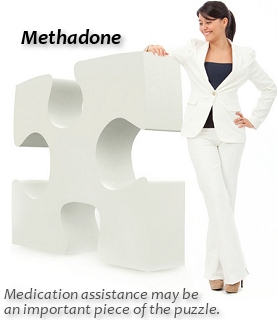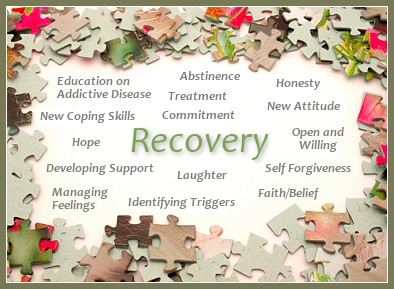 Counseling and Addiction Recovery
Counseling and Addiction Recovery
Methadone + Counseling are two important pieces of the recovery puzzle for many opioid addicted people. In combination, these resources provide the support & tools needed to build a new and better life.
Methadone provides physical stability for clients, and the mental relief of knowing that they will not be sick from opioid withdrawal. Counseling provides essential addiction recovery knowledge, teaches recovery development & relapse prevention skills, and helps clients identify positive thinking, behavior, and lifestyle choices that can turn their recovery journey into lasting success.
In treatment, the counseling component often becomes one of the most important tools of all. It provides clients with a sounding board to vent feelings. And teaches clients how to better manage many of life's difficult challenges through the application of new perspectives and approaches. Counseling often provides a level of emotional support that is not always readily available to someone who may have burned their bridges with family and friends.
 Recovery Treatment Goals
Recovery Treatment Goals
As clients progress through treatment, they will work on various recovery goals with their counselor and/or treatment group. Below are some areas of interest often important to clients:
|
|
 The Role of Support
The Role of Support
Recovery is enhanced when people have support and the encouragement of concerned others. This is not always immediately available. Due to geographical relocation and other factors, clients may find that support is simply not in abundant supply.
 The methadone clinic is very often a recovering person's first interaction with someone who understands, someone who cares, in the way that is needed. Opioid dependency can be a lonely journey with many breakdowns and dead ends along the way. Finding others who share in the solution brings acceptance, energy, hope, and direction.
The methadone clinic is very often a recovering person's first interaction with someone who understands, someone who cares, in the way that is needed. Opioid dependency can be a lonely journey with many breakdowns and dead ends along the way. Finding others who share in the solution brings acceptance, energy, hope, and direction.
Staff and peers provide consistent contact while in the clinic. But connecting with support outside the clinic is also an important goal. Building support & meeting others in the community may take time. Your counselor and other clinic staff will be able to point you in the right direction, and inform you about useful community resources.


Putting The Pieces Together
Successful recovery takes firm personal commitment. If you feel ready, methadone + counseling is a powerful combination that has helped many opioid dependent people find recovery and regain their lives.
Medication-assisted treatment may be the answer for you. The "tools" of recovery work, but they do take time to learn. Methadone provides stability, and time to learn. Struggling for years in active addiction does not have to happen. At some point, a new direction will be needed. Contact your nearest treatment recovery center and review your options. Help is available. Make the call today!
